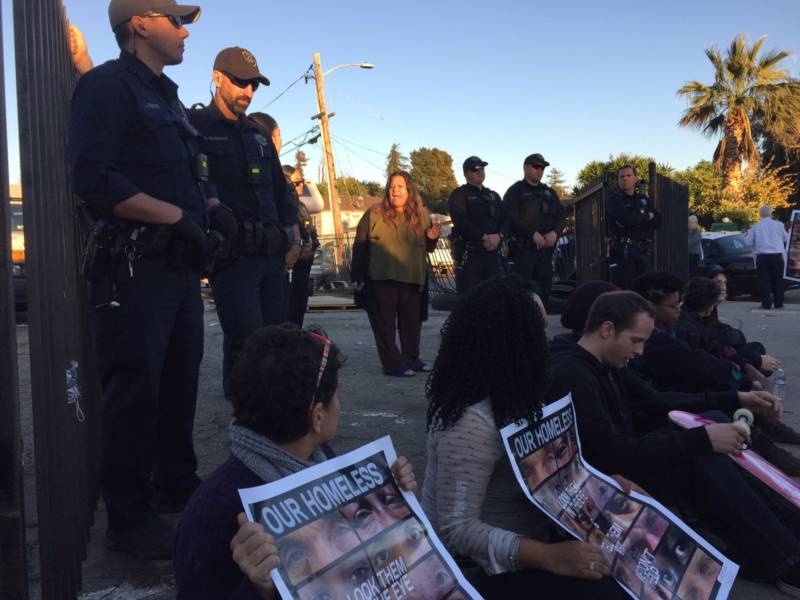Updated at 5:50 p.m. on Thursday:
Oakland city crews evicted a female-led homeless encampment in the Brookfield Village neighborhood of East Oakland Thursday, after residents said they had negotiated with the city to allow them to stay the day prior.
Police broke chains that locked the encampment’s fences together, and the city Department of Public Works began clearing out the residents’ belongings in trucks Thursday afternoon. Twenty to 30 protesters gathered to defend the encampment Thursday, in comparison to a larger crowd of about 50 on Wednesday. Residents like encampment leader Anita de Asis, who goes by the name Needa Bee, questioned the timing of the eviction. “Why did they come after the protesters and the media were gone,” Bee asked.
“While the children were at school, while half of the residents were at their job, they came in and swarmed us. They did not allow us to pack,” Bee said. And when supporters did show up “they didn’t allow supporters in to help us pack.”
The residents’ personal belongings will be stored for 90 days, according to a statement from the city. The statement says residents have been informed on how to retrieve their possessions, and that it will post signs with directions on how to do so once the clean-up is complete.

“The city promised that they would negotiate with us,” said Bee. “We believed they would, but I’m not surprised that they came to evict us today.”
In a statement on Wednesday, the city administrator’s spokesperson Karen Boyd did not confirm a promise to negotiate. She wrote, “the advocates have asked for a meeting with city officials. City officials were working on setting the meeting up, according to Boyd.
That meeting, Bee said, never happened.
Bee planned to take her camper and find somewhere else for her and her daughters to sleep tonight. She won’t be going to a shelter because they do not meet her needs.
Candice Elder, a community activist with The East Oakland Collective who supports the residents, said that specific rules make it impossible for some to use the shelter beds. “Half of the residents here can not even go into the shelter because of their unique circumstances. They have pets, the have minors, they work at night.”
But Elder said it is about more than shelter restrictions, “a shelter is not a home, this was home. This was the only, only, safe curbside community for single women,” she said.
“The city fulfilled its obligation to offer residents shelter and took a compassionate, careful approach to match residents with their specific shelter needs,” the city’s statement said.
But residents like Needa Bee said they don’t understand why the city would not let them stay on the parcel, which has sat empty for decades. As police stood off against protesters, they chanted “homelessness is not a crime.”
“Look at these garbage trucks, these are the moving trucks for the homeless people that the city uses. Garbage trucks,” said Andrea Henson, a homeless advocate who left work to stand with the residents.
One protester was briefly detained and released on-site, police said.
A tense stand off between police and two protestors who are refusing to move the driveway… the crowd closes in and starts chanting “homelessness is not a crime” the police move back. Eviction @VillageOakland in deep east oakland pic.twitter.com/uUzXOUld8Y
— Sandhya Dirks (@sandhyadirks) December 7, 2018

